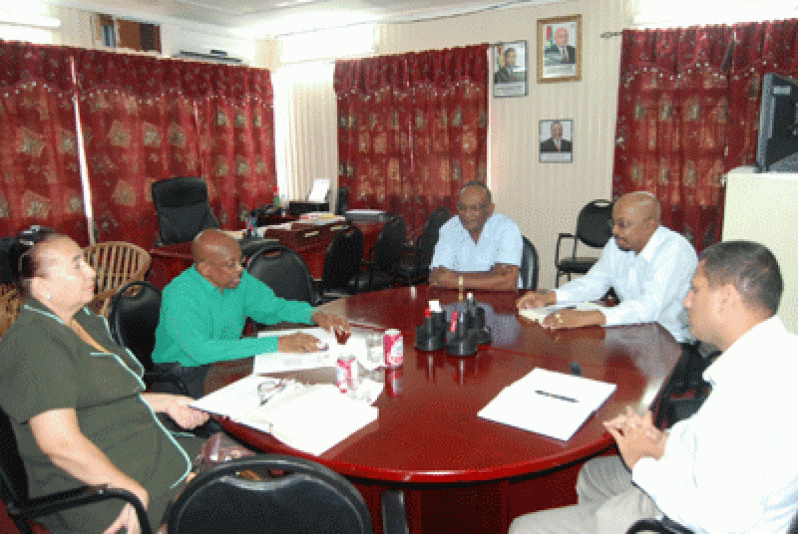TEENAGE pregnancy has decreased in Guyana, over the past few years, as a result of the various educational programmes being conducted by the government.
 Minister of Culture, Youth and Sport, Dr. Frank Anthony made the revelation, on Wednesday, while briefing the media about the various issues that were addressed at a two- day international conference on population, which concluded yesterday at the Guyana International Conference Centre, Liliendaal, Greater Georgetown.
Minister of Culture, Youth and Sport, Dr. Frank Anthony made the revelation, on Wednesday, while briefing the media about the various issues that were addressed at a two- day international conference on population, which concluded yesterday at the Guyana International Conference Centre, Liliendaal, Greater Georgetown.
He chaired one of the sessions at the forum, where delegations met to analyse the position of Guyana and other Caribbean countries and progress made since the Cairo Declaration, which was the outcome of the United Nations coordinated International Conference on Population and Development in Egypt, from September 5 to 13,1994.
According to Anthony, who outlined Guyana’s multi-sectoral approach to health, education and youth, close attention must be paid to the issue of teenage pregnancy, which was one of the topics discussed.
Chief Medical Officer (CMO), Dr. Shamdeo Persaud said the decrease in the percentage of teenage pregnancies locally, cuts across all the teen groups.
He informed that they were close to four percent of all pregnancies in Guyana for the year 2003 in the under-15 age group and this was reduced to one percent in 2011.
Persaud stated, further, that, in 2003, there were 5.2 percent of girls aged 15 and 16, who were pregnant and that lessened to 2.6 percent in 2011, as well as in the 17 to 19 years category, where the percentage went down from 21 percent in 2008 to 17.1 percent in 2011.
MOTHERS DIE
Anthony rejoined to point out that, across the world, there are about 14 million births per year and, of that number, nearly 74, 000 teen mothers die annually during child birth and between 2.2 million and four million teen mothers have various levels of difficulty birthing children.
Some issues, specifically, related to Guyana were highlighted, as well as the different systems the country has in place.
On the subject of sexual reproductive health, Anthony stated that, region wide, there are varying challenges in this regard, like the access teens have to sexual reproductive health services.
He said, if teens want to access sexual reproductive health services from the system, workers within, sometimes, do not want to provide it without parental consent and that is a major issue in the region.
Arising out of the conference, Anthony said they are advocating change, by removing any legislative barriers which exist, in order to allow teens accessibility to those services.
He said they are also advocating that, at the international level, more programmes should be implemented, especially at health centres, to offer sexual reproductive health as an essential part of the package.
Additionally, the minister indicated that a lot of people have signalled that, with funding of some regional programmes coming to an end or being lowered for HIV and sexually transmitted infections (STIs), they have to be careful that the initiatives are absorbed within their respective countries.
He also advocated that countries need to ensure that they continue to allocate money for the fight against STIs and HIV or else there can be a resurgence of the epidemic.
Anthony posited that the region has made significant progress in a number of areas since the Cairo Declaration, and said other matters ventilated at the conference, included chronic non-communicable diseases, migration, education and employment, as well as vulnerable sub-populations.
He said individual countries have their approaches to those questions and are compiling recommendations which they will use to move forward from 2014 onwards.
SCORING SUCCESSES
Speaking to the media, too, Health Minister, Dr. Bheri Ramsaran said his ministry has, quietly, been scoring successes in the battle against complicated and high risk pregnancies.
He identified one of the main groups which suffer from complications and high risk pregnancy as teenagers and, as such, the ministry has been targeting them, because with them they can get the most positive results.
Making reference to the lessening of teenage pregnancies, Ramsaran said it means that there will be less maternal deaths in that age group and the mothers will be more mature and educated.
Concerning male marginalisation, he said a lot of young males are dropping out of the system and not coping academically, but one of the concrete measures coming out of that situation is how to increase the involvement of the male.
He said, while the Ministries of Health, Education and Culture, Youth and Sport will continue to support and try to expand procedures geared towards promoting the health and well-being of females, they are also seeking to do the same for males, who are involved in teenage pregnancy.
Ramsaran said that the conference set the scene to analyse where Guyana is and some of the things the country can learn from fellow Caribbean delegations and vice versa.
Making particular reference to the best practices of Barbados, especially in terms of teenage pregnancy and engaging the men in the process, he said Guyana can learn from this and he and Anthony are committed to doing so.
He also spoke, as well, of the roles of the education system and the Administration, generally, in providing for some of the things which were envisioned 20 years ago to promote the health and wellness of the population.












